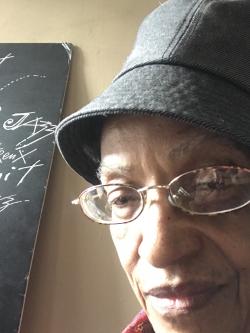WANT TO WRITE A NOVEL? PART 3
Folder:
English For Poets .
VOCABULARY SELECTION
.
There is always a better word.
.
Exercise:
.
He ran.
He charged.
He charged around the corner.
John charged around the corner of his grandfather's house.
John had to get them out, but the fire raged across the entire front of his grandfather's house. He charged around the corner. Breathing hard, by the time he reached the backyard, he found the back porch also engulfed in flames.
Shock became horror when he saw flames climbing across the ceiling of the back porch, roaring down the back stairs, throwing waves of heat at him. Hell fire forced him to retreat.
.
Build the telling with hard action verbs, use concrete nouns and noun clauses, with visible adjectives and adjective clauses. Insert time frames and the sequences of actions enacted by the hero. Give him a name.
.
The state of the character begins the sentence "Shock". Note: subject does not always have to be at beginning. (John was shocked) is the heart of the sentence with verb "was" in the middle. Subject then verb then object (predicate-description that asccepts the action of the verb) is boring after a while. Verb can start sentence for variety: Heaving the hot board aside, John climbed through the bedroom window.
.
This forces you to compose with different word and word forms AND clause structures. As always, vocabulary enhances mood, pace, placement of hero in the detailed setting. Dialog here would determine someone alive inside burning house:
.
His throat clogged as black smoke billowed from the house, John croaked with the force he put behind his shout. "Grandpa! Valarie! Kyle! Can anybody hear me!"
.
Passage opens with description of hero's throat, then setting. This gives the paragraphs variety. You have a billion ways to creatively select words and learn where to place them for optimal impact. Experiment until you develop a library of sentence structures (syntax-the way you organize words in a sentence in your head) to draw from. If all your sentences begin with the name or personal pronoun for a character, you need to work on vocabulary selection and ordering (placement) of those words. I sometimes take the end of a sentence, put it at the front of the sentence, fix the verbs and grammar and voila - varieity. I do that in poetry a lot too. During the edit. The extra words that pop out, I pitch. Some words are unnecessary - "even" is one word I seldom use - it adds nothing and it is contemporary colloquial verbal expression. I seldom use thus (a word that is passing out of ussage) and never use words with "th" on the end like "goeth" or "hath" - bad vocab choices.
.
Exercise:
.
The book fell.
The book fell from Tim's hand.
The book fell to the floor when the alarm went off.
One blaring alarm bell cut into Tim's answer and the book of Shakespeare's play, Macbeth, slipped from his startled fingers and hit the floor like a thunder clap.
.
Numbers are great words to start a descriptive passage. Note the action infused in the simple words used. Hero is named, in classroom. Look at "answer" --the action is done to the word answer, not to Tim. The possible combinations are endless, why stick to one syntax format. Grow each sentence differently. Yep, more work.
.
Tools of writing are the parts of speech. Learn them. Can not write a novel without prepositional phrases and adjective clauses. No way around it. Sorry. (See my series on parts of speech - incomplete, but a good refresher course designed to be easily absorbed). Avoid adverbs - they will drive you insane.
.
Exercise:
.
The car was green.
Nancy Porter's Jaguar was so black it looked green under neon lights.
.
Do not be afraid to explore interesting vocabs, and the ideas they represent, in interesting back-field ways. Remember, just enough description to get setting, dialog, action, or information established. Too little is as detrimental as too much. Balance happens in your ear's aesthetic when you have the vocabulary in the right order. Write it and then read it out loud and let your ears edit for you. A great practice for finding errors or missing words, but also a great way to hear if there is too much or too little description. Break it up, too long descriptive passages are boring. They just are. Add dialog, change description into dialog or into thoughts of characters for diversity. Be more action than description. Too much action and you are writing a movie script not a novel - balance is required for fiction.
.
Bottom line: You can not be a writer without a vocabulary. Time to crack open a dictionary and memorize it.
.
Lady A
10-13-16
908p
.
revised: 01-28-18
revised: 06-14-19
